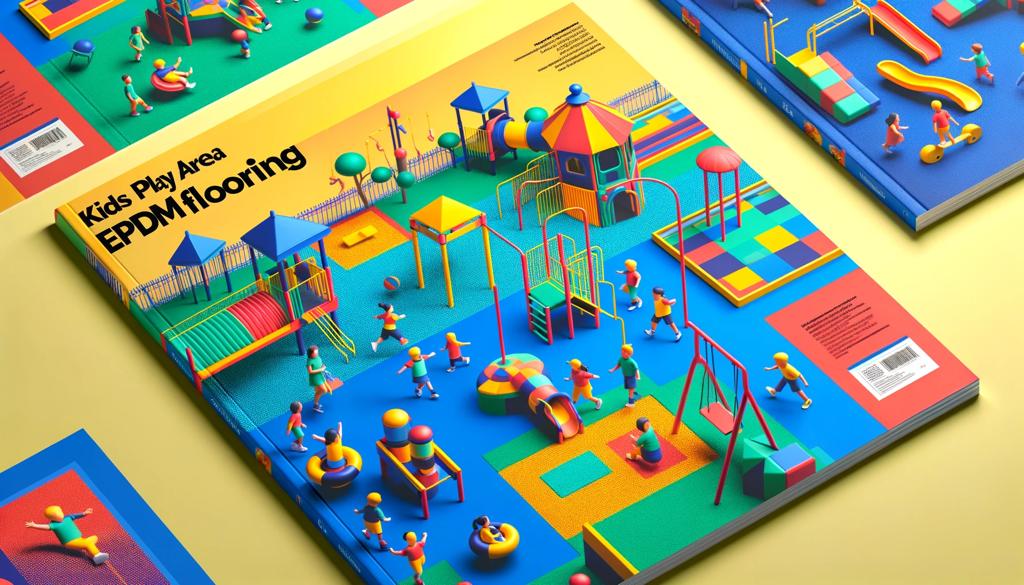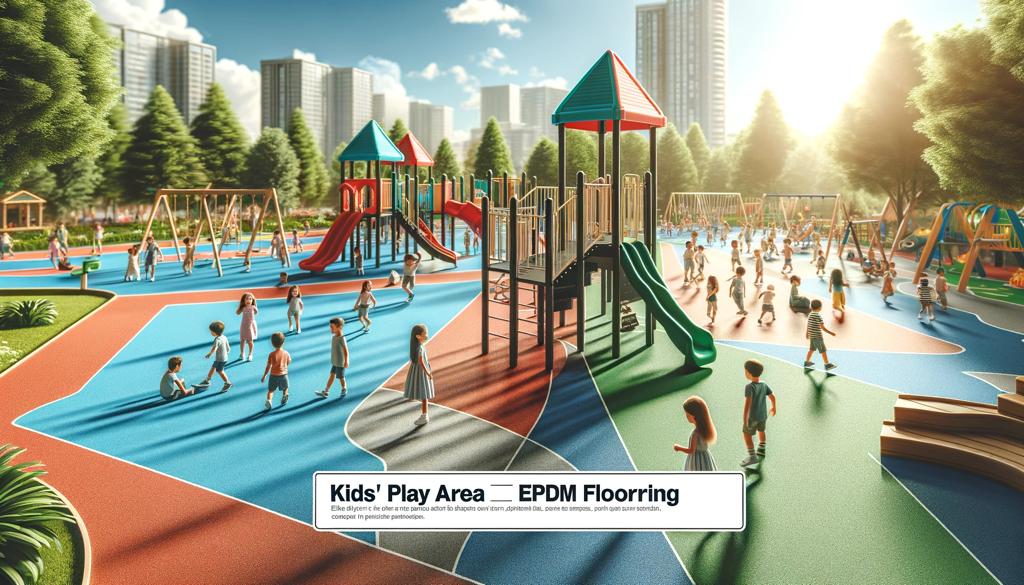Kids Play Area EPDM Flooring

EPDM (Ethylene Propylene Diene Monomer) is a synthetic rubber material that is widely used in the construction of playground surfaces. It is a popular choice for playgrounds due to its durability, safety, and versatility. In this blog, we will discuss the introduction, advantages, and disadvantages of EPDM surfaces for kids’ playgrounds.
Introduction:
EPDM is a synthetic rubber material that is made from ethylene, propylene, and diene monomers. It is a highly durable material that is resistant to weathering, UV rays, and temperature variations. EPDM surfaces are commonly used in playgrounds due to their shock-absorbing properties, which help reduce the risk of injuries from falls. They are also non-toxic and free from harmful chemicals, making them safe for children to play on.
Advantages:
EPDM surfaces offer several advantages over other types of playground surfaces. Some of the key advantages of EPDM surfaces are:
Durability: EPDM surfaces are highly durable and can withstand heavy usage, foot traffic, and environmental elements. They are resistant to cracking, fading, and deterioration, ensuring a long-lasting solution that requires minimal maintenance.
Safety: Safety is a top priority in any space, be it a playground, gymnasium, or outdoor recreational area. EPDM surfaces offer excellent slip resistance, reducing the risk of accidents and injuries. Their natural elasticity provides a cushioned surface, absorbing impact and minimizing the impact force on joints and muscles. Additionally, EPDM surfaces are fire-resistant, making them a secure choice for indoor and outdoor applications.
Versatility: EPDM surfaces can be customized to suit any design preference or specific requirements. They are available in a wide range of colors, patterns, and thicknesses, allowing for endless possibilities in creating attractive and visually appealing spaces. Whether you desire a vibrant playground surface, a sleek gym floor, or a decorative pathway, EPDM surfaces can be tailored to meet your aesthetic and functional needs.
Weather Resistance: EPDM surfaces exhibit remarkable weather resistance, making them suitable for outdoor applications. They can withstand extreme temperatures, UV exposure, moisture, and even harsh chemicals without losing their integrity. This ensures that the surface remains intact and maintains its original appearance, even under challenging weather conditions.
Environmental Friendliness: EPDM surfaces are an environmentally friendly choice compared to other flooring options. They are composed of recycled materials, making them a sustainable and eco-conscious solution. Additionally, their long lifespan minimizes the need for frequent replacements, reducing waste and promoting resource conservation.
Easy Installation and Maintenance: EPDM surfaces are relatively easy to install, regardless of the surface they will be applied to. They can be installed as rolls, tiles, or poured-in-place, depending on the specific requirements of the project. Furthermore, EPDM surfaces require minimal maintenance, as they are resistant to stains, dirt, and moisture. Regular cleaning with mild soap and water is usually sufficient to keep the surface in pristine condition
Disadvantages:
While EPDM surfaces offer several advantages, they also have some disadvantages that should be considered. Some of the key disadvantages of EPDM surfaces are:
Cost: The initial investment in EPDM surfaces may be slightly higher than some alternatives. However, their long-term cost-effectiveness becomes apparent over time.
Installation Time: The installation of EPDM surfaces can take longer than other types of playground surfaces. This is because they require a curing period before they can be used.
Maintenance: While EPDM surfaces require minimal maintenance, they still require some upkeep to ensure their longevity. This includes regular cleaning and inspection to identify any signs of wear and tear.
In conclusion, EPDM surfaces are a popular choice for playgrounds due to their durability, safety, and versatility. They offer several advantages over other types of playground surfaces, including slip resistance, weather resistance, and environmental friendliness. While they have some disadvantages, such as cost and installation time, their benefits make them a smart investment for both residential and commercial purposes.

About Push Sports
Push Sports transcends the realm of sports infrastructure with its comprehensive solutions and innovative monetization strategies, firmly establishing itself as a leader in the industry. Their extensive expertise encompasses the creation of top-tier facilities for a multitude of sports including cricket, football, tennis, and pickleball, all constructed with the highest quality materials and cutting-edge designs. Beyond infrastructure, Push Sports enhances the value of these facilities through well-structured academy programs, nurturing aspiring athletes and fostering a strong community around sports. Simultaneously, their “pay-to-play”; models ensure these state-of-the-art venues are not only accessible to all but also provide a continuous revenue stream, effectively aiding developers in capitalizing on their investments. This integrated approach positions Push Sports as a pioneer in shaping vibrant and economically sustainable sports environments, making it an invaluable partner for any sports development venture.
Category: